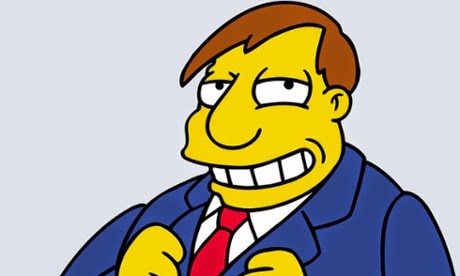What The Simpsons teaches us about Rob Ford and other mayoral mysteries
'That could be anyone's ass' ... esteemed mayor of Springfield 'Diamond' Joe Quimby. Photograph: Photos 12/Alamy ...
https://plus.staravis.com/2014/04/what-simpsons-teaches-us-about-rob-ford.html
Ford’s improprieties as mayor of Toronto are well documented – the crack-smoking, the alleged family ties to drug dealing, the inebriated rages, the vulgar remarks, knocking down councilwoman Pam McConnell – yet to the befuddlement of many, he has maintained his popularity. He could even win again.
His case might seem baffling, but it's not unprecedented. Ford isn’t the first city leader to become embroiled in scandal only to see his poll numbers buttressed. In 1945, mobbed-up James Michael Curley won his fourth term as mayor of Boston while actually in prison for a felony conviction. Marion Barry, while mayor of Washington, DC, was caught on tape smoking crack in 1990, then was re-elected mayor in 1994. London's Boris Johnson in 2009 referred to his £250,000 yearly salary from the Daily Telegraph as “chicken feed” in the midst of a recession where the average British worker made approximately a tenth of that. He was re-elected in 2012. To paraphrase the Farrelly brothers, who you suspect would be loving the Ford scandal, there's something about mayors.
The comparison to Springfield's chief “tax-cheating, wife-swapping, pot-smoking spendocrat” was more than a quick joke. Quimby is good satire for a reason. He embodies exactly we suspect of small-time populist politicians: that they’re two-bit and on the take. Quimby’s stock self-endorsement (“Vote Quimby!”) no matter the situation – say, caught during an extramarital moment at the Sleep-Eazy Motel – is the calling card of a panderer we all recognise: the politician whose own crookedness has convinced him that no scandal could ever outlive the permanent campaign. And often they’re correct, because broadly speaking, whatever sleazy shenanigans they're up to, we’re fine with.
How to explain this mayoral get out of jail free card? After all, a prime minister would never survive what Quimby or Ford or Boris or Barry have done. Canada's Stephen Harper couldn't slur "Bumbaclot" in a Jamaican steak joint. David Cameron’s tenure as British PM would end as soon as he was rescued from a zip line. And if Barack Obama had been caught on tape smoking crack? Americans have threatened impeachment for much less.
A mayor is not expected to tell us “Yes, we can!” – it’s altogether too lofty for cynical urbanites. But when Quimby yells to the mob, “You’re nothing but a pack of fickle mush-heads!” the response he gets feels spot on: “He’s right!” “Give us hell, Quimby!” We are less fooled, or at least fooled for less time, by fantasies of municipal greatness than by those of national grandeur. We know our city too well. And we know ourselves too well.
This is also why even Ford Nation would raise an eyebrow at the Toronto mayor's desire for Stephen Harper’s job, and why Boris can rate as a more popular person than Cameron yet a less capable leader. “The idea of Prime Minister Boris appeals most to those who have the most jaded view of what politics can achieve for the country and themselves,” said Lord Ashcroft last summer, commenting on the discrepancy. “It is the antithesis of the idea that serious times call for serious people – rather, in an age when our problems seem beyond the capacity of governments to solve, we might as well have a leader who cheers us all up.” In other words, a character.
“The people of Toronto know that I am just like them,” Ford told the cheering crowd Thursday night. There might be some truth to that slogan, but if he really wants to win again I might recommend he take yet another page from the Joe Quimby handbook he has used so well. "Rob Ford: If you were running for mayor, he’d vote for you."





